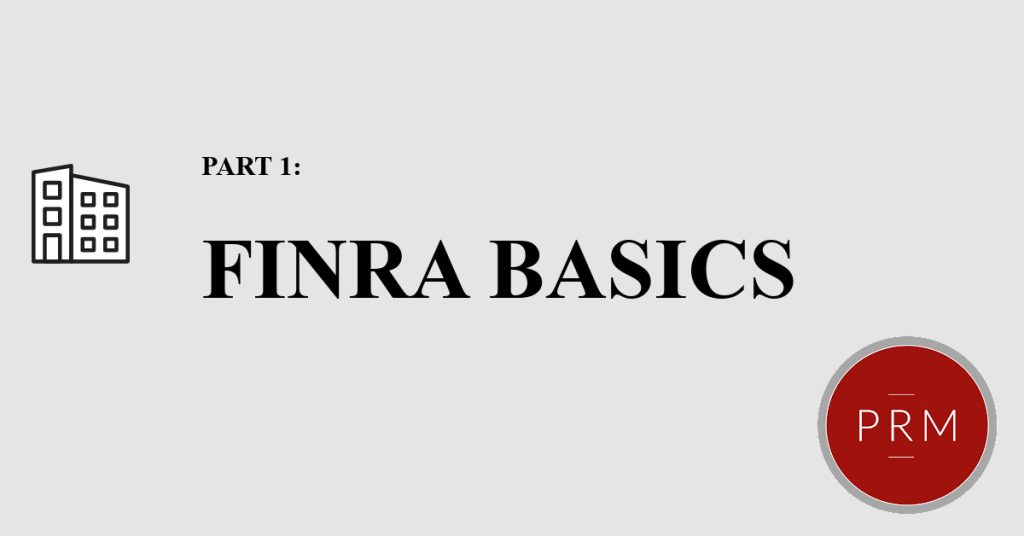
FINRA Arbitration: A General Overview
FINRA, or the Financial Industry Regulatory Authority (formerly known as the NASD), is a self-regulatory organization (SRO) that oversees the brokerage industry in the United States. It enforces securities regulations aimed at protecting investors and ensuring broker-dealers comply with securities industry rules and standards. Additionally, FINRA provides dispute resolution services where investors must arbitrate their disputes with FINRA registered broker-dealers.
Why are Investors and Broker-Dealers Required to Arbitrate their Claims in FINRA?
When an investor opens accounts with a FINRA registered brokerage firm, the opening account agreements include a waiver of the investor’s right to a jury trial. The investor also agrees to resolve any disputes that might arise with the firm through FINRA arbitration, rather than court. As a general rule, courts across the country enforce agreements to arbitrate. Therefore, absent extenuating circumstances, investors who agreed to arbitrate can save time and file any claim they have directly with FINRA (more on that below).
Broker-dealers also must arbitrate disputes with their clients. Broker-dealers hold FINRA licenses that are necessary to conduct business in the financial services industry. Except for rare exceptions, failure to participate in a properly initiated arbitration poses a risk to the firms’ licenses. This threat helps ensure broker-dealers participate in the arbitration process in good faith.
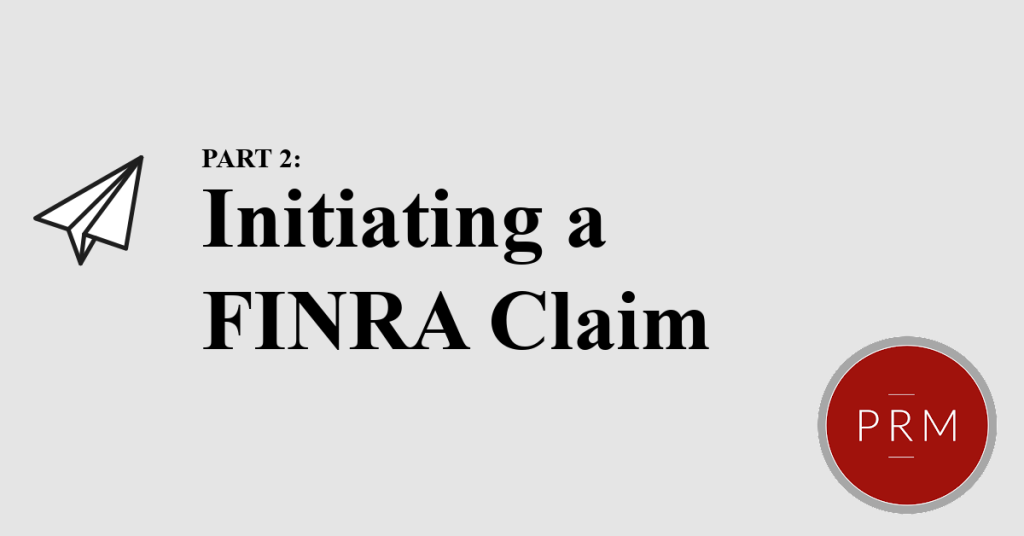
How Investors File Formal Claims
The process starts when the claimant (here, the investor) files a “Statement of Claim.” It provides a synopsis of all allegations of misconduct directed towards a respondent (the broker-dealer).
Next, the investor pays a filing fee. FINRA calculates these fees based on the amount of damages an investor claims to have sustained.
Notably, FINRA arbitration rules require individuals to file their claims within six years of the event that caused the dispute. This is called the FINRA eligibility rule. Additional statutes of limitations can also exist that might negatively impact an investor’s claims. These statutes of limitation can be as short as one year. Therefore, its best practice to file complaints as soon as possible after the investor discovers the misconduct.
How Broker-Dealers Respond to Formal Claims
After an investor files a claim, the respondent has 45 days to respond. FINRA calls this response the “Statement of Answer.” The Statement of Answer includes the firm’s interpretation of the dispute. It may provide any facts and legal theories that the respondent believes will exonerate them from the allegations in the Statement of Claim.
Additionally, the broker-dealer must disclose the written customer complaint information to FINRA under the reporting requirements set out in FINRA rule 4530. From there, a summary of the customer the customer complaint (as reported in the Form U4 and/or Form U5) becomes part of the FINRA Central Registration Depository (CRD) database. Portions of that summary of the complaint also become publicly available on BrokerCheck.
Confidentiality of FINRA Arbitration
FINRA arbitration is a confidential proceeding, unlike a traditional court case. FINRA takes the confidentiality of the parties to arbitration seriously. With limited exceptions, the only publicly available record of a FINRA arbitration is the arbitration award, described in more detail below.
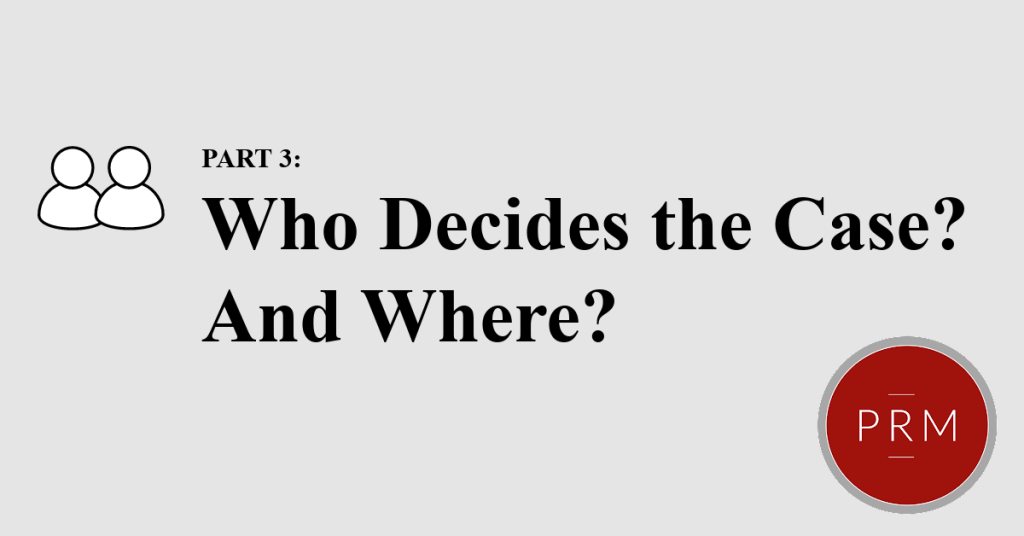
Who Oversees and Makes Decisions About Filed Claims?
A panel of three arbitrators (and sometimes one), rather than a judge and jury, oversees the proceedings. This panel consists of a chairperson, a public arbitrator, and an industry arbitrator. The chairperson is the lead arbitrator. Public arbitrators have no experience in the financial securities industry. Industry arbitrators have experience in the financial securities industry.
If the case does not settle, the arbitrators decide the outcome of the dispute after a formal arbitration hearing similar to a trial in a traditional court case.
Investors can opt to have a panel of all public arbitrators (i.e. arbitrators with no financial industry experience). Some investors (or their counsel) believe arbitrators with industry experience may have biases in favor of the broker-dealer.
Arbitrators are not FINRA employees. But they are compensated. CLICK HERE to learn more about FINRA Arbitration Jobs.
Where Arbitration Hearings Take Place
In general, arbitration hearings are held at a FINRA location closest to the investor’s residence when the dispute took place.
Prehearing Conferences
After arbitrator selection, FINRA schedules a prehearing conference. During the prehearing conference, the claimant, respondent, and panel of arbitrators gather virtually to determine case deadlines, briefing schedules, formal hearing dates, and other preliminary issues.
Very generally speaking, the parties schedule arbitration dates between 9 and 14 months from the date the investor filed the Statement of Claim. This estimate varies significantly, however, because all parties, attorneys, arbitrators, and witnesses must have mutual availability to attend the arbitration.
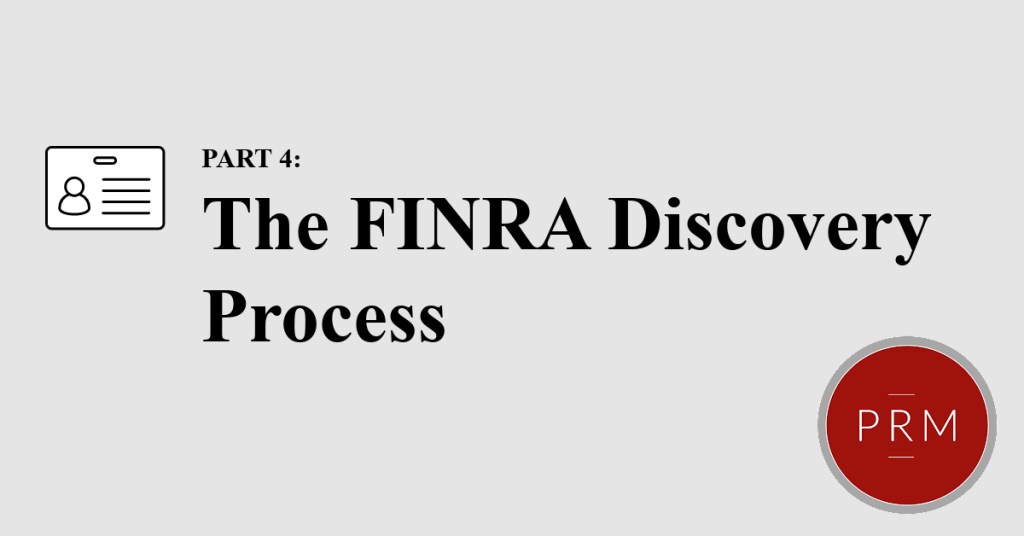
Discovery in Arbitration
Discovery is the part of the process where the claimant and the respondent request documents and information from each other to “discover” evidence necessary to prove or defend the case.
Generally, a document or piece of information is “discoverable” (meaning required to be produced to an opponent) if it is “reasonably calculated to lead to the discovery of admissible evidence.”
To help streamline the discovery process, FINRA has identified certain documents that it has deemed “presumptively discoverable.” Presumptively discoverable documents include things like monthly statements; new account documents; trade confirmations; relevant correspondence; documents that demonstrate the supervision over the investor’s accounts; and several other categories of documents. With some exceptions, all parties are expected to voluntarily produce presumptively discoverable documents.
Parties may “propound” unlimited document and information requests to seek evidence over and above presumptively discoverable documents. If the parties disagree on the discoverability of specific documents or information, the party seeking the document or information may file a motion to compel. The parties brief their arguments for or against production. And the chairperson conducts a hearing session and rules on what must or must not be produced.
To further streamline discovery, FINRA, by rule, strongly discourages depositions, which can become onerous and costly. In traditional court cases, a party can examine witnesses before the trial to gain discoverable documents or information.
Third Party Discovery
FINRA rules allow both the claimant and respondent can seek relevant documents from a third party. Parties can make a motion to request such documents from the Chairperson. If granted, the Chairperson can issue an order of production or a third-party subpoena, which requires the third party to produce the relevant documents or information. This process is known as “Third Party Discovery.”
Third Party Discovery in FINRA arbitration can be somewhat limited. FINRA only maintains jurisdiction over its members (i.e. broker-dealers); and people associated with broker-dealers (i.e. stock brokers/financial advisors). For that reason, it can be difficult to obtain Third Party Discovery from parties unaffiliated with FINRA. But if a FINRA member or associated person receives an order of production or subpoena as a third-party in to a FINRA case, the rules require compliance.
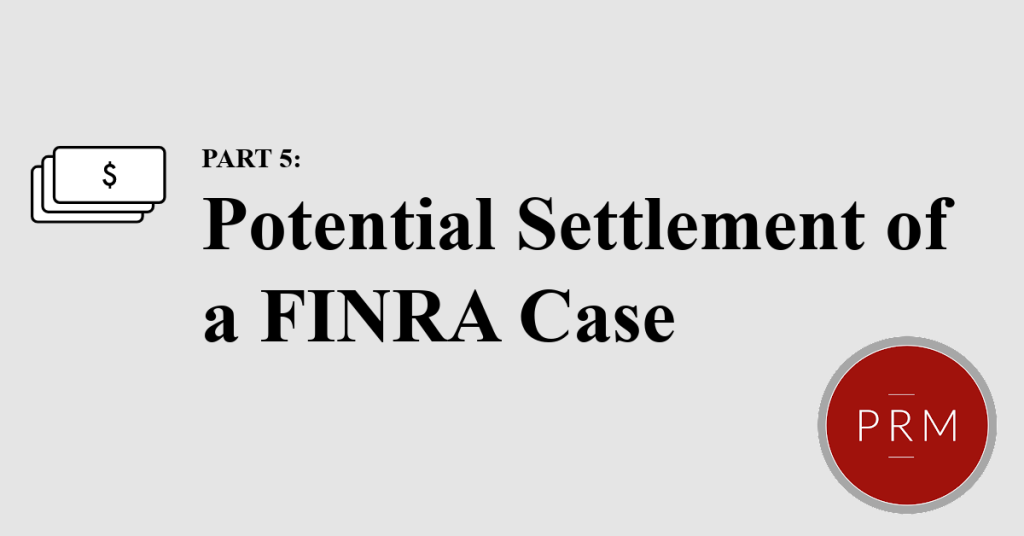
Settlement of a Filed Claim and Common Settlement Tools
Like a traditional court case, parties may agree to settle the case without participating in a formal arbitration hearing. Settlement eliminates the inherent risk of leaving the fate of the case in the hands of arbitrators.
Parties commonly use mediation as a settlement tool. Mediation involves the parties’ agreement to hire a neutral mediator with experience mediating FINRA cases to help the negotiate a settlement. Through “shuttle diplomacy, ” the mediator travels between parties, learns the facts and issues of the case, and attempts to influence the parties’ to settle.
Meditation is non-binding and voluntary, which means the parties may participate in mediation and decide not to settle.
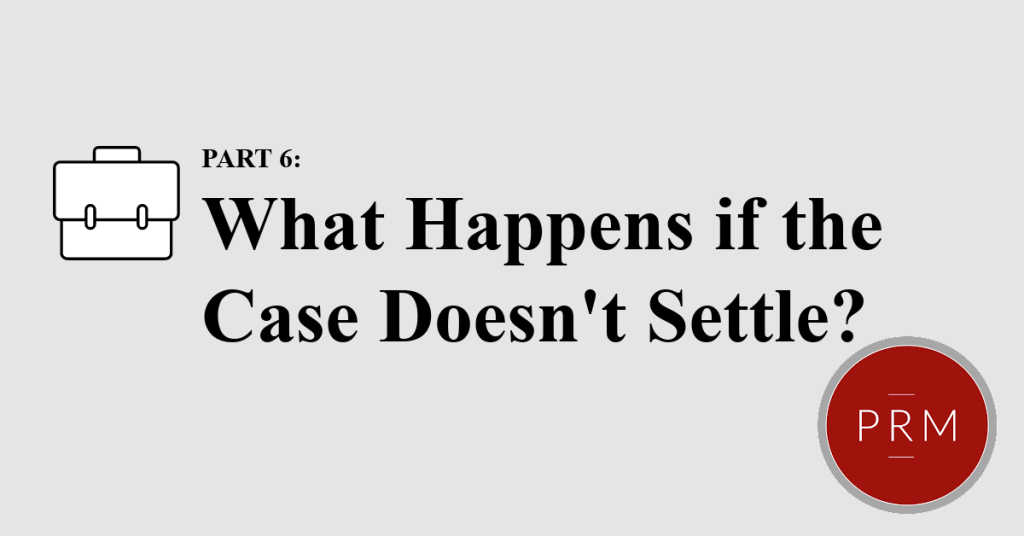
If the Parties Do Not Settle, the Case Goes to a Formal FINRA Arbitration Hearing
Similar to a trial in court, a FINRA arbitration includes an opening statement, closing argument, and examination of witnesses. The parties may also submit arbitration briefs. But unlike a traditional trial, the rules of evidence in a FINRA arbitration are less stringent. The arbitration panel has broad authority to give more leeway on what parties can use as evidence in FINRA arbitration, compared to what parties my use as evidence in a traditional court case. FINRA arbitrations also take place in an informal setting. Typically, arbitrations are held in a conference room with the arbitrators at the head of a conference table with the parties sit on opposite sides.
The duration of an arbitration depends on the complexity of the case. A case can last as short as one day, and as long as several weeks.
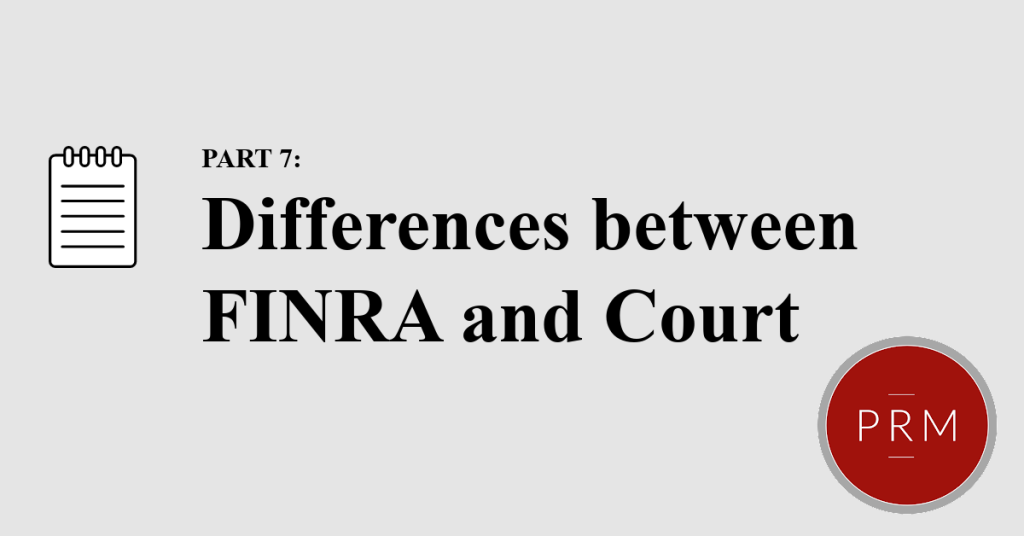
Relevant Procedural Differences Between FINRA Arbitration and Traditional Court Cases
FINRA arbitration also has many procedural differences compared to traditional court cases. Notable among them includes inability (with limited exceptions) for broker-dealers to dismiss a case before the formal FINRA arbitration hearing.
In a traditional court case, a defendant (analogous to a respondent in a FINRA arbitration), can move the court to dismiss a case for “failure to state a claim upon which relief can be granted.” In short, a successful motion to dismiss can end a case in court even before discovery, and long before a trial.
Traditional court cases also enable parties to end a case after the discovery process has begun if the moving party can establish no genuine issue of material fact exits, which entitles the moving party to judgment as a matter of law. While both plaintiffs and defendants can move for summary judgment in traditional court cases, defendants use them more more often than plaintiffs. A successful motion for summary judgment, like a motion to dismiss ends the case before trial. Defending these motions also substantially increase legal fees.
FINRA arbitration rules on the other hand, create extremely limited grounds (described below) to end a case before a formal FINRA arbitration hearing. This benefits investors because it substantially increases the chance they can have their day to formally present their case. It also decreases legal fees attributable to defending motions designed to eliminate their case prematurely.
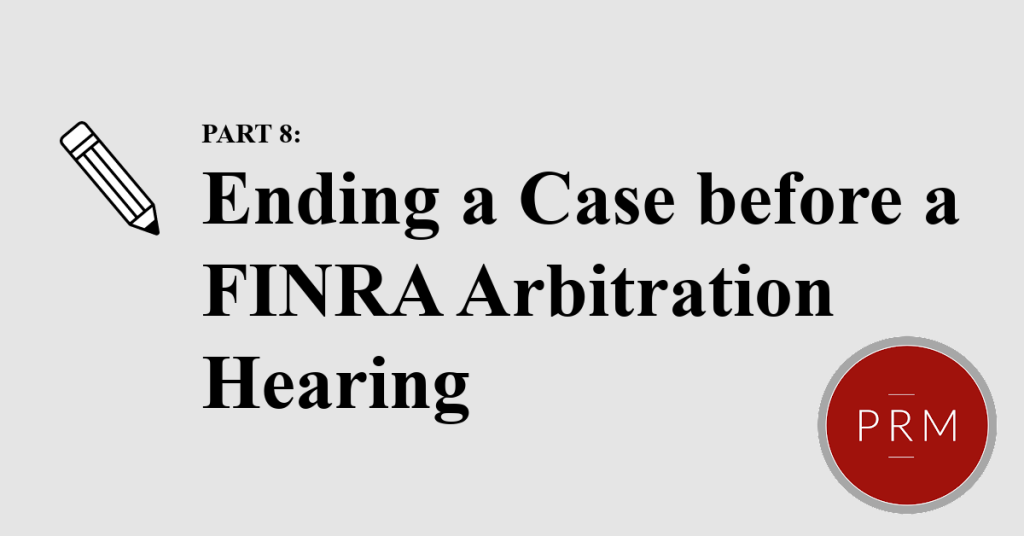
The Limited Grounds to End a FINRA Arbitration Before the Formal Hearing
The FINRA arbitration rules expressly discourage motions to dismiss a case before a party’s case in chief. Other than a motion to dismiss based on eligibility (described above), there are only three limited grounds that a broker-dealer can dismiss the investor’s case before a formal FINRA arbitration hearing:
Reason One
Where the investor released their FINRA arbitration claims in a signed settlement agreement. This refers to a situation where an investor previously settled their claim and released the broker-dealer from liability. Then files another claim against the broker-dealer that the investor already released through settlement.
Reason Two
Where the broker-dealer can establish that it had no association with the accounts, securities, or conduct at issue.
Reason Three
Where the investor previously brought the same claim against he same party that was adjudicated on the merits. This refers to the scenario where an investor brings a claim that they already made previously and lost.
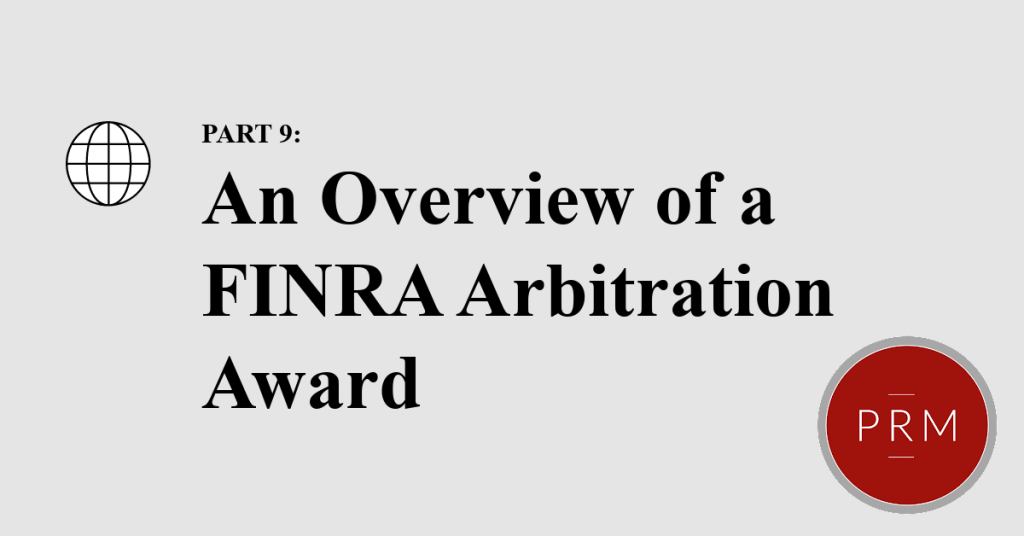
The FINRA Arbitration Award
After the arbitration hearing concludes, the arbitrators will issue a decision, known as the “award.” Unless the parties jointly agree to an“explained decision,” the arbitrators will not provide their rationale for the decision. Accordingly, FINRA arbitration awards are generally short, and state in simple terms if the investors claims are granted or denied. If the claims are granted, the award will dictate the amount in damages the broker-dealer must pay the investor. Conversely, if the investor’s claims are denied, the award will simply state that the investor’s claims were denied.
If the Award requires the broker-dealer to pay money damages to the investor, the broker-dealer must pay that amount within 30 days.
FINRA Arbitration Awards Are Final
A FINRA arbitration award is final, and not subject to appeal. Comparatively, a party to a verdict in a traditional court case can appeal a wide range of issues, which can prolong the process. The finality of FINRA arbitration awards helps eliminate the risk of additional legal fees attributable to responding to, or initiating appeals. But the finality of arbitration awards also require investors to have competent counsel that can put them in the best position to win in FINRA arbitration.
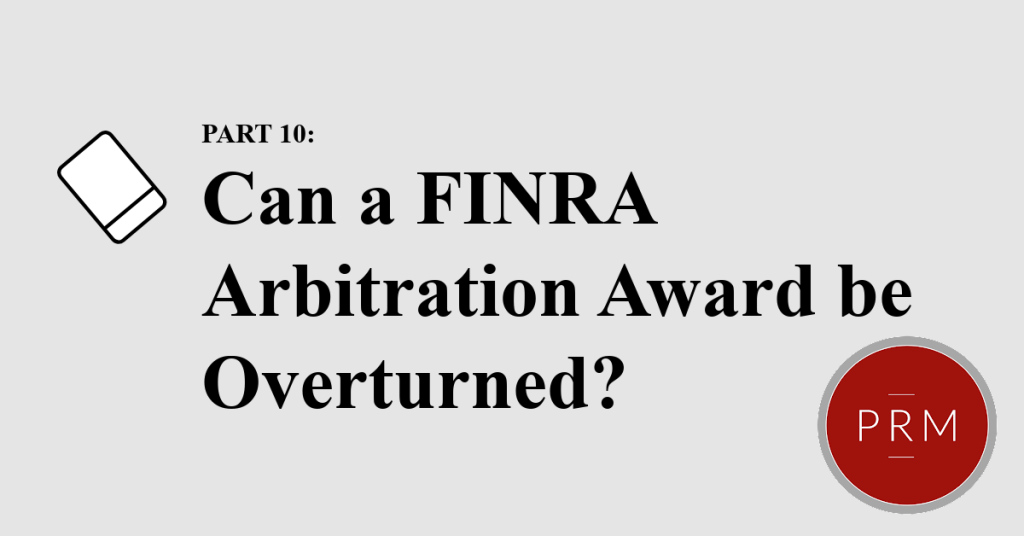
The Limited Grounds to Overturn a FINRA Arbitration Award
State and federal codes of civil procedure provide one, limited procedural mechanism to overturn an arbitration award. Under the federal rules (which most states duplicate), a party can “vacate” (i.e. overturn) an arbitration award under the following conditions: 1) where there is fraud or corruption of the arbitrators; 2) where there is arbitrator bias; or 3) where the arbitrators exceeded their authority. A petition to vacate an arbitration award is a limited exception to the finality of an arbitration award. And petitions to vacate arbitration awards are not often successful.
*The Law Offices of Patrick R. Mahoney is a full service law firm with extensive experience litigating cases in FINRA. This page is for information purposes only and does not constitute legal advice, nor is it a comprehensive explanation of all securities-related rules and procedures. If you believe you have a claim, you should speak to competent counsel to better understand your options.*

